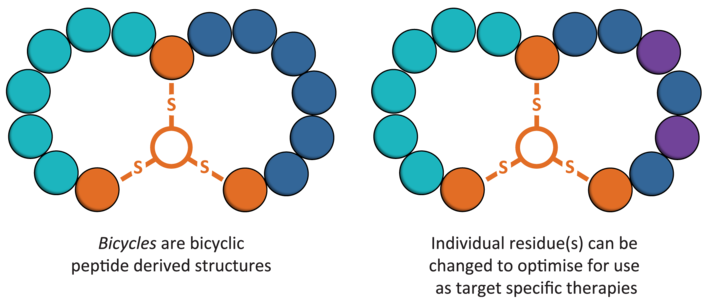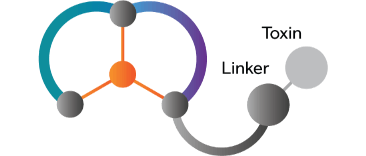Newsletter Signup - Under Article / In Page
"*" indicates required fields
A collaboration between Bicycle Therapeutics and Cancer Research UK has yielded its first peptide to enter clinical trials for solid tumors.
Bicycle Therapeutics, the pioneer of the bicyclic peptide platform, has dosed the first patient in a Phase I/IIa trial with its solid tumors candidate, BT1718. The study will test the drug’s safety and efficacy in around 120 patients with tumors that express high levels of a molecule called Membrane Type 1 Matrix Metalloproteinase (MT1-MMP).
The technology was developed by Greg Winter, who founded Cambridge Antibody Technology, which discovered the blockbuster therapeutic antibody, Humira, and Christian Heinis, one of his postdocs. Their tripartite molecules are made up of a ‘Bicycle’ that recognizes the tumor target, a linker that is cleaved once the drug reaches the tumor microenvironment, and a toxin to kill cancer cells. The linker is essential in keeping the toxin inert until it reaches the tumor, which ensures that the body is exposed to it for as little time as possible.

BT1718 is Bicycle Therapeutics’ lead molecule, which is an example of a ‘Bicycle Toxin Conjugate’. The candidate targets MT1-MMP, a protein that plays an important role in cell invasion and metastasis, with its expression in solid tumors associated with poor patient outcomes. So far, BT1718 has shown promising efficacy in treatment-resistant cancer samples taken from patients and reduced toxicity in comparison with other highly potent cancer treatments.

Nigel Blackburn, Cancer Research UK’s director of drug development, has high hopes for the candidate: “BT1718 has shown great promise in preclinical studies, and trials like this are a big step towards helping more patients survive their cancer. We urgently need new, safe and effective therapies for patients with hard to treat cancers such as non-small cell lung cancer and triple negative breast cancer that this drug will be tested on.”
With Bicycle’s technology entering the clinic, an exciting showdown with antibody-drug conjugates (ADCs) has been set up. The field is being led by ADC Therapeutics, which raised $200M (€170M) to see its two lead candidate through the clinic. However, Winter told us that his technology could “get the toxins deep into tissues.”
With the approval of the first two CAR-T therapies by Novartis and Gilead, this hype area of biotech could provide strong competition if the two companies can expand their technology into the solid tumors space. In addition, Belgian biotech Celyad is developing its own version of CAR-T, which binds 8 ligands that are expressed on over 80% of solid and hematological malignancies.
Bicycle’s announcement adds even more competition to the cancer therapies field, which is already overflowing with exciting technology. This is no bad thing, with cancer still one of the biggest killers in the world, so any help would be welcomed by patients and clinicians alike.
Images – sezer66 / shutterstock.com; Bicycle Therapeutics
Oncology R&D trends and breakthrough innovations







